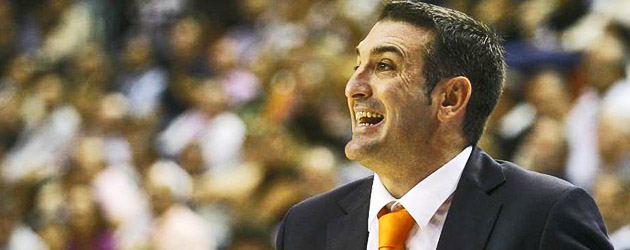by Rob Scott / @robscott33
Spain has been the dominant national team in European basketball over the past decade, and the man charged with overseeing its next generation of talent is Luis Guil. His team won the European under-18 championships in 2011, and in 2012 his under-20s picked up the bronze, behind the play of future stars like Alejandro Abrines and Guillermo Hernangomez.
Beginning his coaching career at the age of just 17, with stints as head coach in the ACB at Fuenlabrada and UCAM Murcia and nearly ten years of experience with the junior national programme, the Barking Abbey Basketball Academy in East London must have been delighted when Luis agreed to come over and share some of that wealth of knowledge. Barking Abbey has hosted the Nike Invitational Junior Tournament and provided dozens of recruits for NCAA programmes since its establishment in 2005.
When ELA discovered such a respected basketball mind was domiciled right on one of our doorsteps, we just had to go and get his take on the state of things in Europe and the UK.
Rob Scott: How did you come to arrive Barking Abbey, an interesting story?
Luis Guil: The first thing is, I think English basketball has made a lot of progress in the last few years.They put a lot of resources into it because of the Olympic Games in London. I have been a coach of national teams in Spain for the last ten years and I looked and saw a lot of progress in basketball in England. I noticed the [Barking Abbey] academy because I was a coach to Daniel Clark, son of [Academy director] Mark Clark, in Spain at a Christmas tournament. I coached the Madrid team, Daniel was a player at Estudiantes and I was his coach in the tournament. I knew that Mark was doing a good job in Barking Abbey and a lot of the players at the moment are going on to play in the NCAA, or going onto play professionally here in England.
One thing more, at this moment in Spain, it is very difficult, there are a lot of crises, and coaches need to go out of Spain to work. It’s a good opportunity for me to learn English, and in Spain this academy model does not exist. I looked at how the academy here works and I can help them to progress the players. I think the thing is that they help me and I help them. I think it’s good for both parties.
RS: Did you approach any BBL teams? Were you surprised you didn’t end up at a professional team, given your background and success in Spain?
LG:I looked at one. I think it’s very important to work, some BBL teams here only practice three days a week. In Spain, all under-12, under-10 teams practice three days a week. When it’s under-14, under-16 teams, it’s possible they practice every day, with physical, tactical and technical sessions. At this moment, my opinion is that here in England, there is a lot of potential to grow.
In the next few years, England could have a very good league if everyone wants this. But it’s necessary to work and to put money in to progress this league. Here, you have money, and all people like sports. This is a good opportunity to make progress. The NBA think that London is one of the best cities to show the NBA. From this, London and England have a lot of options to progress basketball in the next few years. But it is necessary to put in time and there must be money for this.
One thing is that in my opinion the players here must work in basketball before under-12s, under-10s. Why? Because then when they go to the first team, in the BBL, they will know basketball better. At the moment they are good physically, they are good technically, but they must read basketball, understand basketball. In the rest of Europe, players start early, they read basketball and understand basketball.
 Posts
Posts
